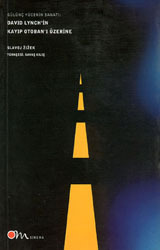What do you think?
Rate this book


80 pages, Paperback
First published January 1, 2005
[The seriousness of the cliched dialogue in Lynch] does not signal a deeper spiritual level underlying superficial cliche’s, but rather a crazy assertion of the redemptive value of naive clichés as such.
... today’s prevailing “psychologization” of social life is the mask (or mode of appearance) of its exact opposite, of the growing disintegration of the proper “psychological” dimension of authentic self-experience. “Persons” that we encounter are, more and more, experienced as individuals talking like puppets who repeat a prerecorded message. Recall the New Age preacher telling us to rediscover our true Self: is it not that the very style of his words - the style of repeating, like an automaton, learned phrases contradicts his message?
The key to the Lacanian solution to the problem of the relationship between subjective libidinal experience and the libidinal economy embodied in the objective symbolic order, the “big Other,” is that the gap between the two is original and constitutive [of both!]: there is no primordial direct self-experience which is then, in a secondary move, “reified” or objectivized in the working of the symbolic order. The subject himself emerges through such a displacement of his innermost self-experience onto the “reified” symbolic order.